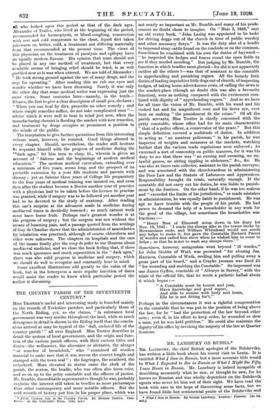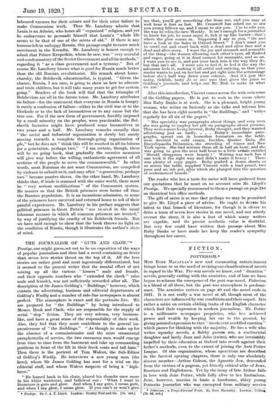MR. LANSBURY ON RUSSIA.•
ME. LANSBUItY, the chief British apologist of the Bolsheviks, has written a little book about his recent visit to Lenin. It is entitled What .1 Saw in .Russia, but a more accurate title would be What I Expected to See in Russia or What I Might See Fifty Years Hence in .Russia. Mr. Lansbury is indeed incapable of describing accurately what he saw, or thought he saw, for he knows no Russian and was wholly dependent on the Bolshevik agents who never let him out of their sight. We have read the book with care in the hope of discovering some facts, but we have found little but sentimental praise of the Bolsheviks and • What I Seto in Russia. By George Lanabury. London : Parsons. [O. ed. net.] laboured excuses for their crimes and for their utter failure to make Communism work. Thus Mr. Lansbury admits that Lenin is an Atheist, who hates all organized " religion, and yet he endeavours to persuade himself that Lenin's " whole life seems to be that of one of the saints of old." If there is any humour left in unhappy Russia, this passage ought to cause much merriment in the Kremlin. Mr. Lansbury is honest enough to admit that Prince Kropotkin, whom he saw, was " very scornful and condemnatory of the Soviet Government and all its methods," regarding it as a class government and a tyranny." But of course Mr. Lansbury knows what is good for Russia much better than the old Russian revolutionist. His remark about Luna- charsky, the Bolshevik educationalist, is typical. " Given the chance, Russia, I am sure, is going to show us how to educate and train children, but it will take many years to get her system going." Readers of the book will find that the triumphs of Bolshevism are all in the future tense. Mr. Lansbury attributes its failure—for the statement that everyone in Russia is hungry is surely a confession of failure—either to the civil war or to the blockade or to the lack of locomotives or to any cause but the true one. For if the new form of government, forcibly imposed by a small minority on the peoples, were practicable, the Bol- shevik factories might have produced some locomotives in two years and a half. Mr. Lansbury remarks casually that " the social and industrial organization is slowly but surely moving towards a complete thorough-going organization of p," but he does not " think this will be reached in all its fulness for a generation, perhaps two." " I am certain, though, there will be no going back, that gradually the coercive measures will give way before the willing, enthusiastic agreement of all sections of the people to serve the commonwealth." In other words, most Russians do not want Communism, are compelled by violence to submit to it, and may after " a generation, perhaps two " become passive slaves. On the other hand, Mr. La.naliury thinks that, if trade is resumed with the outer world, there must be " very serious modifications " of the Communist system. He assures us that the British prisoners were better off than the Russian population. It is an incautious admission, as some of the prisoners have survived and returned home to tell of their painful experiences. Mr. Lansbury in his preface suggests that political prisoners in Great Britain "are treated in the usual inhuman manner in which all common prisoners are treated," by way of justifying the cruelty of his Bolshevik friends. But we have said enough to show that the book throws no light on the condition of Russia, though it illustrates the author's state of mind.







































 Previous page
Previous page